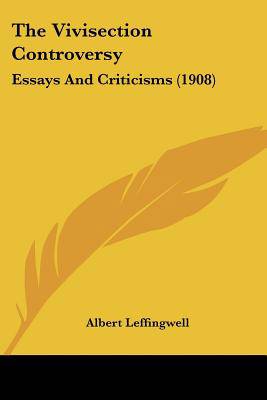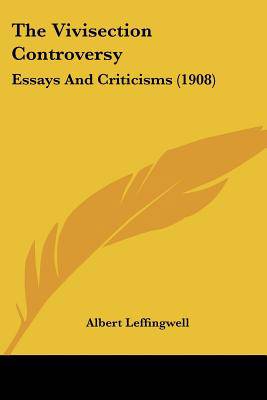
- Afhalen na 1 uur in een winkel met voorraad
- Gratis thuislevering in België vanaf € 30
- Ruim aanbod met 7 miljoen producten
- Afhalen na 1 uur in een winkel met voorraad
- Gratis thuislevering in België vanaf € 30
- Ruim aanbod met 7 miljoen producten
Zoeken
€ 40,95
+ 81 punten
Uitvoering
Omschrijving
The Vivisection Controversy: Essays and Criticisms is a book written by Albert Leffingwell in 1908. The book explores the ethical and moral issues surrounding vivisection, the practice of performing experiments on living animals for scientific research. The book is a collection of essays and criticisms that Leffingwell wrote on the topic, which were originally published in various magazines and journals. The essays cover a range of topics related to vivisection, including the scientific value of animal experimentation, the cruelty of the practice, and the potential alternatives to vivisection.Leffingwell argues that vivisection is not only morally wrong but also scientifically flawed. He believes that animal experimentation is often unnecessary and that there are alternative methods of research that are more effective and humane. He also criticizes the use of animals in medical education and argues that there are better ways to teach medical students.The book provides a comprehensive overview of the vivisection controversy in the early 20th century and offers a thoughtful and thought-provoking analysis of the issue. It is an important historical document that sheds light on the ethical debates surrounding animal experimentation and the efforts of early animal rights activists to end the practice.This scarce antiquarian book is a facsimile reprint of the old original and may contain some imperfections such as library marks and notations. Because we believe this work is culturally important, we have made it available as part of our commitment for protecting, preserving, and promoting the world's literature in affordable, high quality, modern editions, that are true to their original work.
Specificaties
Betrokkenen
- Auteur(s):
- Uitgeverij:
Inhoud
- Aantal bladzijden:
- 262
- Taal:
- Engels
Eigenschappen
- Productcode (EAN):
- 9781104922788
- Verschijningsdatum:
- 10/08/2009
- Uitvoering:
- Paperback
- Formaat:
- Trade paperback (VS)
- Afmetingen:
- 152 mm x 229 mm
- Gewicht:
- 353 g

Alleen bij Standaard Boekhandel
+ 81 punten op je klantenkaart van Standaard Boekhandel
Beoordelingen
We publiceren alleen reviews die voldoen aan de voorwaarden voor reviews. Bekijk onze voorwaarden voor reviews.











